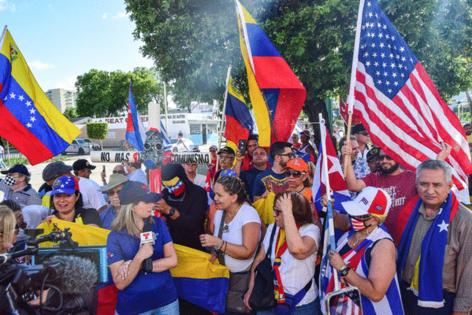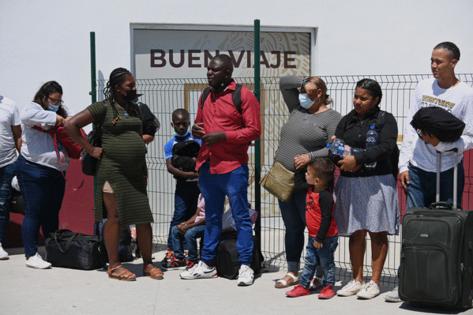Trump administration loses appeal in bid to revoke parole for Cubans, other migrants
Published in News & Features
A federal appeals court has dealt the Trump administration another loss in its bid to revoke deportation protections and work permits for more than a half-million Cubans, Haitians, Nicaraguans and Venezuelans, many of them living in South Florida, who were granted entrance into the United States under a humanitarian parole program.
The U.S. Court of Appeals for the 1st Circuit, based in Boston, denied the administration’s request to stop a federal judge’s order blocking the Department of Homeland Security’s plan to end the parole program, which was implemented during the Biden presidency. In doing so, the appellate court found that “en masse termination” of the migrants’ parole is subject to review by the courts — contrary to the Homeland Security secretary’s view.
“For present purposes it suffices to say that the Secretary has not at this point made a ‘strong showing’ that her categorical termination of plaintiffs’ parole is likely to be sustained on appeal,” the appeals court wrote in a three-page order Monday.
In mid-April, U.S. District Judge Indira Talwani ruled that the paroled migrants can stay in the United States as they pursue immigration benefits. In effect, her ruling prevented Homeland Security’s secretary, Kristi Noem, from revoking their parole status on the whole as part of an administration plan to end the humanitarian program on April 24.
‘Essential workers’
Immigration lawyers representing the certified class of CHNV migrants — named after the initials of the four nationalities affected — rejoiced over the appellate court’s decision rejecting the administration’s bid for a stay of the judge’s ruling. Now, their lawsuit can move forward, barring a possible appeal by Homeland Security to the U.S. Supreme Court.
“Our clients and class members are essential coworkers, life partners, and family members to others in the United States, and they have done everything the U.S. government has asked of them,” Karen Tumlin, founder and director of the Justice Action Center, said in a statement. Now the Trump administration needs to uphold its end of the bargain.”
In her 41-page order filed in Boston federal court, Talwani supported migrants’ legal right to pursue their lawsuit challenging the administration’s revocation plan.
“While [Trump administration officials] are correct that the Secretary’s discretion in this area is broad, their conclusion that the Secretary’s actions are wholly shielded from judicial review is incorrect,” Talwani wrote.
Talwani said that while her role in reviewing the agency’s revocation order is “limited,” she added she has the authority to stay the secretary’s “termination” of parole for Cubans, Haitians, Nicaraguans and Venezuelans because “it revokes, without case-by-case review, previously granted parole and work authorizations for individuals currently in the United States.”
The district and the appellate court rulings in Boston signaled a major victory for the paroled immigrants from the four countries, who sued the Trump administration in the hope of remaining in the United States for a two-year period. Many of them have been living and working in South Florida after being sponsored by relatives to come to the United States to apply for asylum or other protections instead of trying to get in through the U.S.-Mexico border, where a migrant crisis erupted during the Biden administration’s watch.
Talwani said that if she did not issue her stay putting the Homeland Security secretary’s termination order on hold, the consequences would be dire for the paroled immigrants.
‘Dangers in their native countries’
“The immediate impact of the shortening of their grant of parole is to cause their lawful status in the United States to lapse early — in less than two weeks,” the judge wrote. “If their parole status is allowed to lapse, [the paroled immigrants] will be faced with two unfavorable options: continue following the law and leave the country on their own, or await removal proceedings.
“If [they] leave the country on their own, they will face dangers in their native countries,” she added.
Freezing the status quo prevents hundreds of thousands of immigrants from Cuba, Haiti, Nicaragua and Venezuela from imminent termination of their parole status by the Trump administration. Still, the paroled immigrants, depending on when they arrived in the United States, face a two-year deadline that affects each one differently — it could fall next month, this summer or even in 2026 for those who arrived as recently as last December, for example.
The immigration lawyers cautioned that the path forward was fraught with challenges, including for those paroled immigrants who may have applied for asylum, Temporary Protected Status or, in the case of the Cuban nationals, a green card under the decades-old Cuban Adjustment Act.
Advocates hope that, even if an immigrant’s two-year parole status expires, federal authorities usually allow any person with a pending asylum or other benefit request to remain in the United States until it’s resolved.
But that courtesy would not likely be extended by the Trump administration, which argued that the Homeland Security secretary’s order terminating the parole program was not subject to review by a court.
To be clear, the judge’s ruling only blocked the administration’s move to revoke the parole status and work permits of all the immigrants from the four countries. Her decision, however, did not provide protections for any pending applications for additional immigration benefits.
In March, President Donald Trump sought to halt the humanitarian parole program as part of his crackdown on ending legal pathways for immigrants to come and stay in the United States under the administration of his predecessor, Joe Biden.
Secretary Noem’s action — published on March 25 as a notice in the Federal Register and scheduled to take effect 30 days later — was based on a flawed interpretation of immigration law, said Judge Talwani, an appointee of former President Barack Obama. At a hearing in Boston federal court in early April, Talwani said the administration’s goal was to place the paroled migrants on a deportation fast-track, but authorities relied on a wrong interpretation of the process.
Troubled countries
She said Homeland Security viewed the migrants as individuals who illegally crossed the U.S. border and could be removed on an expedited basis. She said they should instead be viewed as migrants who were granted permission to enter the United States under a grant of parole.
“What you’re prioritizing is not people coming over the border but the people who followed the rules,” Talwani said during the hearing.
As of December 2024, the last full month Biden was in office, a total of 531,690 people had come through the parole program. That includes 110,240 Cubans, 211,040 Haitians, 93,070 Nicaraguans, and 117,330 Venezuelans who flew into U.S. airports.
The CHNV group represented by the class-action case come from the region’s most troubled countries. In Cuba, the island remains under a repressive dictatorship and Cubans are experiencing repeated blackouts and shortages of food and medicine. In Haiti, there hasn’t been a general election in nearly a decade; more than a million have been displaced by armed gang violence and the country’s volatile capital is on the verge of collapse. In Venezuela and Nicaragua, repressive regimes have also prompted a humanitarian crisis that has forced millions to flee.
Biden created the parole program so people from the four countries would have a new legal avenue to come to the U.S for two years, in an attempt to reduce irregular migration at the U.S.-Mexico border. People could use the program to come to the U.S. as long as they had a financial sponsor here, could arrange for their airfare, and passed health and background checks. About 30,000 people a month were coming to the U.S. under the program since it began in January 2023.
But the Trump administration said the program does not align with the president’s foreign policy and did not have much impact on curbing the flow of migrants at the border. Homeland Security intends to prioritize for deportation those who have not properly filed a request for an immigration benefit to remain lawfully in the U.S. This includes applying for adjustment of status, asylum or Temporary Protected Status.
©2025 Miami Herald. Visit at miamiherald.com. Distributed by Tribune Content Agency, LLC.










Comments